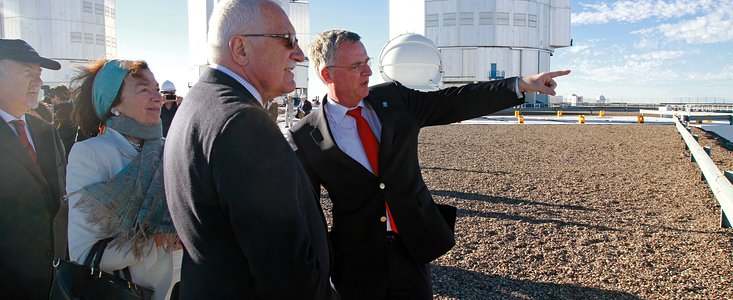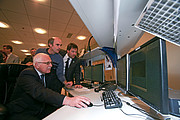Nota de prensa
El Presidente de la República Checa visita el Observatorio Paranal de ESO
7 de Abril de 2011

El 6 de Abril de 2011, el Observatorio Paranal de ESO fue honrado con la visita del Presidente de la República Checa, Václav Klaus, y su esposa, Livia Klausová. El Presidente Klaus además aprovechó la oportunidad para admirar el cerro Armazones, futuro lugar del proyecto E-ELT.
El distinguido visitante pudo conocer las instalaciones técnicas del observatorio, y presenció la apertura del domo de uno de los cuatro telescopios de 8,2 metros del Very Large Telescope de ESO al iniciarse las observaciones nocturnas en Cerro Paranal, el observatorio en luz visible más avanzado del mundo.
“Estoy encantado de dar la bienvenida al Presidente Klaus al Observatorio Paranal y de mostrarle en persona la instalación astronómica líder en el mundo que ESO ha diseñado, construido y que opera para la astronomía Europea”, dijo el Director General de ESO, Tim de Zeeuw.
El Presidente Klaus respondió: “Estoy muy impresionado con la extraordinaria tecnología que ESO ha construido aquí, en la mitad del desierto. Los astrónomos checos ya están aprovechando estas instalaciones y esperamos que la industria checa y su comunidad científica contribuyan al futuro E-ELT”.
Desde la plataforma del VLT, el Presidente tuvo la oportunidad de admirar Cerro Armazones así como otras vistas espectaculares del Desierto de Atacama chileno que rodea Cerro Paranal. Adyacente a Paranal, Cerro Armazones ha sido seleccionado como el lugar del futuro E-ELT (ver comunicado de prensa anterior). ESO está esperando la aprobación de su consejo directivo hacia finales de 2011 para seguir adelante con el E-ELT, que tendrá un costo de mil millones de euros. Se espera que la construcción comience en 2012 y el inicio de las operaciones está planificado para el comienzo de la próxima década.
El Presidente Klaus fue acompañado durante la visita por el Ministro de Relaciones Exteriores de la República Checa, Karel Schwarzenberg, el Embajador Checo en Chile, Zdenek Kubánek, representantes de gobierno y una delegación de empresarios checos. Los anfitriones del grupo en Paranal fueron el Director General de ESO, Tim de Zeeuw; el Representante de ESO en Chile, Massimo Tarenghi; el Director de Operaciones, Andreas Kaufer; y Jan Palous, delegado de la República Checha en el Consejo de la ESO.
Después de la apertura de los telescopios, el Presidente Klaus pudo disfrutar de una espectacular puesta de Sol en el Océano Pacífico desde la plataforma del VLT. Luego visitó la sala de control del VLT, donde se operan los cuatro telescopios gigantes y el Interferómetro del VLT (VLTI). Aquí el Presidente participó en las observaciones realizadas desde la consola de una de los telescopios del VLT.
Información adicional
ESO, el Observatorio Europeo Austral, es la principal organización astronómica intergubernamental en Europa y el observatorio astronómico más productivo del mundo. Es apoyado por 15 países: Alemania, Austria, Bélgica, Brasil, Dinamarca, España, Finlandia, Francia, Holanda, Italia, Portugal, el Reino Unido, República Checa, Suecia y Suiza. ESO desarrolla un ambicioso programa enfocado en el diseño, construcción y operación de poderosas instalaciones de observación terrestres que permiten a los astrónomos hacer importantes descubrimientos científicos. ESO también cumple un rol principal en promover y organizar la cooperación en investigación astronómica. ESO opera tres sitios únicos de observación de clase mundial en Chile: La Silla, Paranal y Chajnantor. En Paranal, ESO opera el Very Large Telescope, el observatorio óptico más avanzado del mundo. ESO es el socio europeo de un revolucionario telescopio, ALMA, el proyecto astronómico más grande en desarrollo. ESO está actualmente planificando el European Extremely Large Telescope, E-ELT, el telescopio óptico y de infrarrojo cercano de 42 metros de diámetro, que llegará a ser “el ojo más grande del mundo en el cielo”.
Enlaces
Contactos
Massimo Tarenghi
ESO Representative in Chile
Santiago, Chile
Teléfono: +56 2 463 3143
Correo electrónico: mtarengh@eso.org
Gonzalo Argandoña
ESO education and Public Outreach Department
Santiago, Chile
Teléfono: +56 2 463 3258
Celular: +56 9 9 829 4202
Correo electrónico: gargando@eso.org
Douglas Pierce-Price
Public Information Officer
Garching, Germany
Teléfono: +49 89 3200 6759
Correo electrónico: dpiercep@eso.org
Francisco Rodríguez (Contacto para medios de comunicación en Chile)
Red de Difusión Científica de ESO
y European Southern Observatory
Teléfono: +56-2-463-3151
Correo electrónico: eson-chile@eso.org
Acerca de la nota de prensa
| Nota de prensa No.: | eso1112es-cl |
| Nombre: | ESO Director General, Paranal, President, Very Large Telescope |
| Facility: | Very Large Telescope |
Our use of Cookies
We use cookies that are essential for accessing our websites and using our services. We also use cookies to analyse, measure and improve our websites’ performance, to enable content sharing via social media and to display media content hosted on third-party platforms.
ESO Cookies Policy
The European Organisation for Astronomical Research in the Southern Hemisphere (ESO) is the pre-eminent intergovernmental science and technology organisation in astronomy. It carries out an ambitious programme focused on the design, construction and operation of powerful ground-based observing facilities for astronomy.
This Cookies Policy is intended to provide clarity by outlining the cookies used on the ESO public websites, their functions, the options you have for controlling them, and the ways you can contact us for additional details.
What are cookies?
Cookies are small pieces of data stored on your device by websites you visit. They serve various purposes, such as remembering login credentials and preferences and enhance your browsing experience.
Categories of cookies we use
Essential cookies (always active): These cookies are strictly necessary for the proper functioning of our website. Without these cookies, the website cannot operate correctly, and certain services, such as logging in or accessing secure areas, may not be available; because they are essential for the website’s operation, they cannot be disabled.
Functional Cookies: These cookies enhance your browsing experience by enabling additional features and personalization, such as remembering your preferences and settings. While not strictly necessary for the website to function, they improve usability and convenience; these cookies are only placed if you provide your consent.
Analytics cookies: These cookies collect information about how visitors interact with our website, such as which pages are visited most often and how users navigate the site. This data helps us improve website performance, optimize content, and enhance the user experience; these cookies are only placed if you provide your consent. We use the following analytics cookies.
Matomo Cookies:
This website uses Matomo (formerly Piwik), an open source software which enables the statistical analysis of website visits. Matomo uses cookies (text files) which are saved on your computer and which allow us to analyze how you use our website. The website user information generated by the cookies will only be saved on the servers of our IT Department. We use this information to analyze www.eso.org visits and to prepare reports on website activities. These data will not be disclosed to third parties.
On behalf of ESO, Matomo will use this information for the purpose of evaluating your use of the website, compiling reports on website activity and providing other services relating to website activity and internet usage.
Matomo cookies settings:
Additional Third-party cookies on ESO websites: some of our pages display content from external providers, e.g. YouTube.
Such third-party services are outside of ESO control and may, at any time, change their terms of service, use of cookies, etc.
YouTube: Some videos on the ESO website are embedded from ESO’s official YouTube channel. We have enabled YouTube’s privacy-enhanced mode, meaning that no cookies are set unless the user actively clicks on the video to play it. Additionally, in this mode, YouTube does not store any personally identifiable cookie data for embedded video playbacks. For more details, please refer to YouTube’s embedding videos information page.
Cookies can also be classified based on the following elements.
Regarding the domain, there are:
- First-party cookies, set by the website you are currently visiting. They are stored by the same domain that you are browsing and are used to enhance your experience on that site;
- Third-party cookies, set by a domain other than the one you are currently visiting.
As for their duration, cookies can be:
- Browser-session cookies, which are deleted when the user closes the browser;
- Stored cookies, which stay on the user's device for a predetermined period of time.
How to manage cookies
Cookie settings: You can modify your cookie choices for the ESO webpages at any time by clicking on the link Cookie settings at the bottom of any page.
In your browser: If you wish to delete cookies or instruct your browser to delete or block cookies by default, please visit the help pages of your browser:
Please be aware that if you delete or decline cookies, certain functionalities of our website may be not be available and your browsing experience may be affected.
You can set most browsers to prevent any cookies being placed on your device, but you may then have to manually adjust some preferences every time you visit a site/page. And some services and functionalities may not work properly at all (e.g. profile logging-in, shop check out).
Updates to the ESO Cookies Policy
The ESO Cookies Policy may be subject to future updates, which will be made available on this page.
Additional information
For any queries related to cookies, please contact: pdprATesoDOTorg.
As ESO public webpages are managed by our Department of Communication, your questions will be dealt with the support of the said Department.

